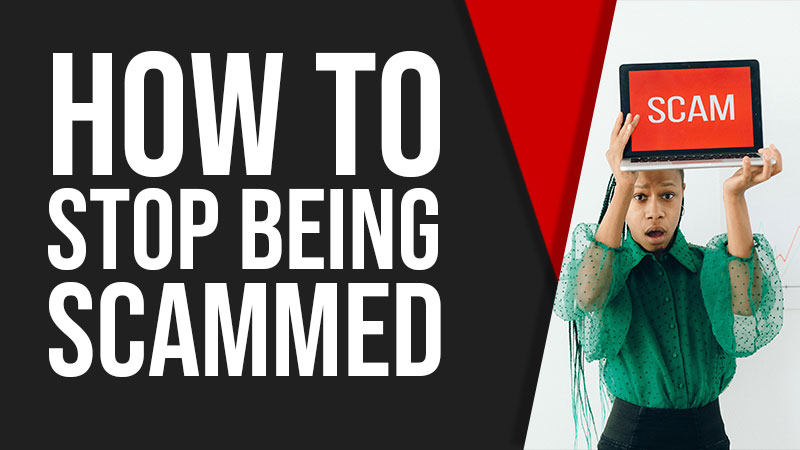7 Signs You're Being Scammed and How to Avoid It
Share this content :

Do you ever wonder if the person you’re talking to is nothing but a fraud? While that might not always be true, there are several cases of scammers and cheats trying to earn your goodwill. Though scams are as old as time, the growth of the internet and e-mail marketing has only multiplied these liars. What’s worse is that some of them are becoming so skillful that it’s almost hard to believe they are fake. To keep your money and your safety in check, here are the signs you're being scammed and how to stop it.
Most common types of scams
In general, scams are deceitful and elaborate schemes designed to rob you of well-earned money. In many cases, it’s a con where the scammers lie to gain your trust. Sometimes, they might ask for your financial aid or for your banking information. Other times, they’d threaten and blackmail you into giving them what they want. There are thousands of scams that exist, but they all have to do with deception. Here are the most common scams and how they can hurt you and your savings.
Identity theft
One of the most well-known and destructive types of scams today is identity theft. It happens when someone manages to steal or copy your personal information. In essence, they steal your identity to gain access to different bank accounts and other sensitive information. By taking over your “name”, they can quickly take out tons of money or apply for several loans. In addition, they might even try to slander your name so that they can blackmail you into giving them more cash.
Credit and debit fraud
In this scam, criminals will try to take your bank and card information. Sometimes, this means stealing the card itself. In other cases, they might trick you into giving your card details, such as the account number and the card verification value (CVV).
Once they get these details, they’ll try to withdraw a lot of money or buy multiple things online. However, before you start panicking, there is some good news. Due to the sensitive nature of credit cards, the signs you’re being scammed with are easier to detect. That’s why many banks and credit card companies take extra care to spot them and alert you immediately.
For example, you can be notified through email or phone about any odd or unauthorized purchases. Better yet, the banks usually don’t issue any liability to the owner, though they might take time to investigate the matter first.
Cryptocurrency fraud
Cryptocurrencies are among the most innovative and eye-catching inventions of finance today. Several people have made hundreds or thousands of dollars through cryptocurrency trade. Plus, there are even businesses that accept popular cryptocurrencies, such as Bitcoin or Ethereum, as payment.

However, it’s also become one of the go-to schemes for scammers and frauds alike. These people can build fake websites or cryptocurrency channels that seem so believable. Then, they use these fake sites to get people to unload as much cash as they can. By the time they find out, hundreds of dollars are already wasted or stolen away.
Debt collection fraud
Some scammers are so bold that they’ll even pose as government agencies or formal organizations to try and swindle you. There are many instances of people posing as FBI agents, IRS representatives, and debt collection companies. The last one can be a frightening experience, as they’ll demand that you pay an existing or outstanding debt. For instance, they might claim that you have over $30000 of unpaid student debt and that you’re about to reach a deadline that could impose higher sanctions or even jail time.
If you don’t have any debts or you keep close track of them, you’ll be able to spot the lies when they come in. However, if you do have unpaid debts and aren’t sure of the caller’s identity, you can always check the Fair Debt Collection Practices Act (FDCPA). Under this law, collection agencies have to approach you in a professional manner. So, if you tell them to stop and they don’t listen, it’s one of the telltale signs you’re being scammed.
Fake charity calls
Emotion can be one of the most powerful tools in a scammer’s arsenal. It’s how they can trick people into paying or giving money away, especially if it’s for “charity”. In these scams, criminals will use legitimate and real-life issues to try and trick people into donating money. For example, they might pretend to be representing an organization for military veterans or a cancer awareness group that needs your money for an upcoming event or fundraiser. Not only is this a cruel act to take your cash, but it can also damage or harm the image of those who do need your help.

Romance scams
Aside from charities, another infamous fraud is the romance scam. Here, scammers can build fake identities or impersonate celebrities to try and charm their way into a victim’s heart. They might even go as far as to send you gifts to try and gain your favor.
Then, once you’re hooked, they will begin asking for money or personal information. Soon, they’ll use this to take away your money and buy what they want for themselves. What’s worse is that it can devastate the person when they realize the fraud, especially if the lover’s identity is completely fake.
How do I know that I’m being scammed?
Whether you’ve faced a fake company request or a pretentious charity call, you know that a scam is trying to steal from you. However, as I said before, criminals are starting to get smarter by the day. As cybersecurity enhances, the tactics that scammers use also evolve. To keep you safe, here are the seven key signs you’re being scammed.
1. You’re suddenly contacted by a company you’ve never spoken to before.
Imagine that you scroll down your email inbox, only to see an alert from a company like Microsoft or Amazon. Before you even open the mail, you notice from the subject line that there’s a user error or a false transaction. You might be tempted to open the email to try and figure things out.
However, before you do, here’s one thing to consider: have you ever been in contact with either of these companies? More importantly, have you ever noticed an email from a company or organization that you’ve never even spoken to? If so, that message is most likely a scammer’s lure. You’re better off deleting that email or sending it to the spam box.
In case you’re worried that it could be the real deal, there are two ways you can check. First, examine the sender’s account photo and listing. If it doesn’t match the company’s approved email or has the company’s logo, it’s likely a fake. You could also check the financial registry if it’s reportedly from a lender or debt collector. Check the registry to see if the company name is even listed; if it’s not there, it’s definitely a scam.
2. You’re being rushed into doing something.
If a caller or email pressures you into making a deposit, donation, or financial purchase, block them right away. A legitimate and professional business would never try to force or coerce you into making these decisions. In fact, if the caller loses their temper or blackmails you, it’s one of the most obvious signs you’re being scammed. Remember, scammers would be more desperate and stubborn in getting you to do what they want.
3. You receive an e-mail or letter with poor grammar and spelling.
When it comes to checking your emails, keep in mind that any professional company will make sure to proofread whatever they send. The last thing that a business like Google or Apple would want is to make a poorly written and spelled-out email.
Scammers don’t necessarily have that cautious air. If you notice that there are multiple grammatical mistakes, from poorly written sentences to missing punctuations, it’s likely a scammer is trying to trick you. It’s also likely that English is not their native language, hence the poor grammar.
Ironically, though it’s one of the most obvious signs you’re being scammed, it could also be done by design. Sometimes, poor grammar in an email helps a scammer find out who is more likely to fall for their tricks. It can also make the email seem more legitimate because no one would realistically write a perfect message. So if you feel that you have a scam email, make sure to delete or report it immediately.
4. You get threatened if you don’t do something.
As I mentioned before, a legitimate company would never try to rush or threaten you into making financial decisions. That said, what if the email or caller you get is claiming to be an officer? There are scams where the caller pretends to be an FBI agent or an NSA official, who will try to scare and intimidate you into giving money. They might threaten you with jail time, felony charges, and maybe even physical harm.

Here’s one thing you have to remember: no good officer would ever do this to you. Plus, it’s highly unlikely that an FBI agent or some other government official would call you unless it’s a serious matter. So if the caller claims to be an officer of some kind, it’s likely one of the signs you’re being scammed. If you know you’ve done nothing wrong, you’re better off ignoring the crook on the phone.
5. You’re overcharged or overcompensated for a service.
One of the most common scams you’ll find online is the overpayment or refund scheme. As demonstrated in this video by Scammer Payback, the scammer will either call or email you about a supposed overpayment. They’ll claim that your refund or your charged service costs much less than the actual amount. For example, as shown in the video, the scammer tries to trick the potential victim by changing the account number. Instead of a refund for $400 or $4000, they overcompensate with $40000 on the victim’s balance.
Once the trick occurs, the scammer will try to beg or guilt the victim into sending back the rest of the money. They’ll make claims about losing their job or being unable to provide for their kids to try and gain your trust. Again, if they try to guilt you into giving back money, take their words with a pinch of salt. Professional organizations always double-check their financial choices before sending any money back, with some even using automated bots to handle the calculations. So, if an employee is begging you to resend the money, think twice before making that decision.
In addition, if they start blaming you or yelling at you, it’s definitely one of the signs you're being scammed.
6. You’re asked to pay through odd or unconventional ways.
Aside from overcharging, you’ll notice in the Scammer Payback video that the scammer is asking the “victim” to pay back the cash through untraceable means. For example, they might ask for repayment through Google Play gift cards or by sending cash in a package. A legitimate organization would never go through these means, especially since these are usually untraceable and hard to account for. So, if someone suggests sending money to a random address or using gift cards for refunds, it’s most likely a fraud.
7. You notice that there are viruses on your computer.
Lastly, when it comes to making a scam happen, scammers tend to use viruses in their emails. Even the simple act of opening a fraudulent message can already upload viruses and Trojan horses to corrupt your computer. If you notice that there are multiple pop-up ads or frequent and unexpected crashes, it might be from a computer virus that a scammer uploaded.
What do I do to stop getting scammed?
Being scammed is not a fun experience. It can definitely hurt people’s pride as much as it harms their bank accounts. That’s why you need to make sure that you know how to stop or avoid scams before it’s too late. To help you out, here are three key steps to take when you realize you might be or are being scammed.
Contact authorities, including your banks.
The first step is to always inform the authorities. Scams are a notorious crime and they can affect you and your loved ones in many ways. Aside from losing cash, scammers might try to sell your information online or use it as blackmail. If you feel that you are being scammed, always make sure to review your bank accounts and contact the right authorities.
For example, you can always contact the Federal Trade Commission to report a scam or a fraud that involves your money. Their contact information is available on the official government website. You could also use this site to update them of any scam websites or fake landing pages.
Change your passwords and login details.
The next step to take is to change your personal information details right away. Update your passwords and logins quickly to protect your banking information. With the growth of social media, scammers might use these accounts to try and access your savings or checking accounts.

Also, keep any of your password details or information somewhere safe. You can use verified security apps, like Dashlane, to manage and monitor your passwords. In addition, Dashlane can also generate new passwords for your login credentials, which can be more effective than coming up with a personalized code or phrase.
Remember that you aren’t to blame.
The last step is to remember that you aren’t to blame. It’s common for victims to feel ashamed or upset at the scam. Many of them feel that they are at fault because of what they’ve risked or lost. Remember that it’s not your fault. Scammers are cunning and cruel people, and you wouldn’t be the first victim they’ve cheated. What’s important is that you use the information you know now to keep yourself protected. Once you follow these steps, you can feel more confident in spotting and stopping a scam before it ruins any other lives.
Did you find value in this article? You can also help others by sharing this post with your family and friends. Get a copy of my FREE book here. You will learn practical tips on personal finance, money management, and how to become a millennial millionaire!
Share this content :
Copyright © 2023 Munif Ali. All rights reserved.

